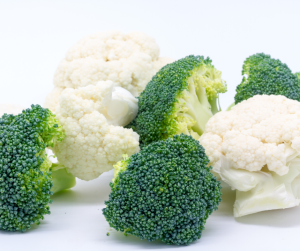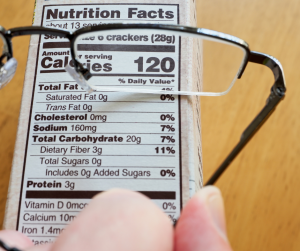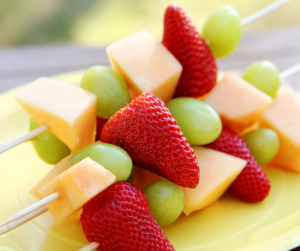Many people enjoy frequent snacking. There are so many choices to choose from! Some snack choices can be unhealthy and others healthy. Healthy snacking is important at any age. Why not make the most of your snacking by choosing healthy food choices that benefit your health?
By choosing nutrient-dense snacks, you are providing your body with important nutrients, vitamins, minerals, and fiber. Moderate portion sizes are important too. In making wise snack choices you can control your saturated fat, sodium, cholesterol, and sugar intake. Snacks can add to your calorie intake and increase your risk for obesity if you aren’t careful how much you are eating (over time) in one sitting.
I teach my students – “It’s a small handful, not the whole canful when it comes to eating nuts! Be wise, watch your portion size”.
“It is also a good idea not to eat from a container, bag, or box. Serve one portion on a plate or napkin and put the serving container away and out of sight. If the whole container is visible, it is too easy to go back for more and more and more”.
Have a snacking plan and decide in advance what you are going to snack on. Set limits. It is easier to eat healthily when you have healthy snacks on hand and within reach. Put healthy snacks on your grocery list, include them in your weekly menu plan, and pick them up during shopping trips. Prepare them the night before. Choose nutrient dense snacks over empty-calorie snacks. Pack and take nutritious snacks with you on the go!

What are some snack ideas that have nutritional value?
- Baby carrots and hummus
- Low sodium pretzels with hummus
- A small container of fresh grapes
- Strawberries https://blogs.ifas.ufl.edu/browardco/2023/03/27/enjoy-seasonal-strawberries/
- Popcorn
- ½ of a fresh banana
- Watermelon https://blogs.ifas.ufl.edu/browardco/2023/07/05/sweet-and-tasty-watermelon/
- Low-fat or fat-free cheese cubes or a cheese stick
- Animal crackers
- Avocado slices with some Pico de Gallo
- Cottage cheese and fruit
- Graham crackers and milk
- A small yogurt and fruit parfait
- Raisins
- Trail mix
- A small bag of whole grain cereal
- Apple slices and peanut butter
- Nuts and seeds
- Whole grain crackers and low-fat cheese
- ½ a turkey sandwich on whole wheat bread
- A bag of cherry tomatoes
- Crisp carrot and celery sticks
- A rice cake with low fat tuna salad
- Cut up fresh broccoli and cauliflower florets
- A frozen fruit bar with whole fruit and limited sugar

Choose snacks that are lower in sodium, sugar, and saturated fat
Watch for added salt, sugar, and saturated fat which can contribute extra, empty calories to your diet. Try making healthier versions of packaged snacks at home so you can choose the ingredients, serving size and include what you like. For example: make your own mini, mixed, fresh fruit salad, trail mix, and/or bite-sized sandwiches. Wash and cut up your own vegetables and bag them up in snack-size portions. Serve nuts from the container and put them in small portions in reusable containers or snack-sized zip-type bags.

Read the label
Check the nutrition label when at the grocery and shopping for snacks. Look at the caloric, sodium, saturated fat, sugar, and fiber content. Choose whole grains over refined grains. Choose low sodium pretzels, crackers, and nuts. Select fresh fruit and vegetables in season and better yet, on sale. Low-fat cheese is also a good option as well as food and beverages without a lot of added sugar.
Carefully read the number of calories that are in one serving. Calories in snacks can add up quickly. Look for snacks that are around 100-200 calories per serving. Generally, the average person eats about 2,000 calories each day. This could break down to 600 calories for breakfast, 600 calories for lunch, 600 calories for dinner, and one 200-calorie snack for a total of 2,000 total calories in one day.

Food safety
Always practicing food safety when handling and preparing snacks. Wash your hands for 20 seconds with soap and water before prepping foods. Use clean cutting boards and knives. Clean and sanitize surfaces. Keep perishable foods refrigerated or in a cooler type of bag with ice packs to help lower the risk of food poisoning or a food-borne illness.

Conclusion
Make sure you are snacking to nourish your body, not calm your nerves, reduce boredom, and/or decrease your stress level.
Eat for good health. Always follow the advice of your healthcare provider. Choose a variety of fruits, vegetables, whole grains, lean protein foods, and low-fat dairy as nutrient-dense snack options. Limit your portion size. Remember a snack is a snack, not a meal. Control the frequency and amount of snacking between meals.
Be creative and think about nutrition when deciding what to snack on. Have healthy snacks planned, visible, and ready to grab and go!
Now that this blog is written, I am going to snack on some crunchy cucumber slices and roasted red-pepper hummus. I am also going to make some small, fresh-fruit kebabs to eat at work this week. LOL. What is your favorite healthy snack?
Enjoy the benefits of healthy snacking and eating!

UF/IFAS Extension, Family and Consumer Sciences resources to learn more.
Dietary Fiber – https://blogs.ifas.ufl.edu/browardco/2023/07/05/dietary-fiber/
Control your cholesterol – https://blogs.ifas.ufl.edu/browardco/2023/06/01/control-your-cholesterol/
All about saturated fat – https://blogs.ifas.ufl.edu/browardco/2023/06/02/all-about-saturated-fat/
Eat foods with healthier fats – https://blogs.ifas.ufl.edu/browardco/2023/06/06/eat-foods-with-healthier-fats/
Follow the rainbow for good health – https://blogs.ifas.ufl.edu/browardco/2022/03/01/follow-the-rainbow-for-good-health-during-nutrition-month/
Portion size matters – https://blogs.ifas.ufl.edu/browardco/2023/01/13/portion-control-matters-portion-size-matters/
Focus on fruit and vegetables – https://blogs.ifas.ufl.edu/browardco/2022/07/01/get-health-benefits-this-summer-focus-on-fruits-and-vegetables/
An equal opportunity institution.
 10
10
